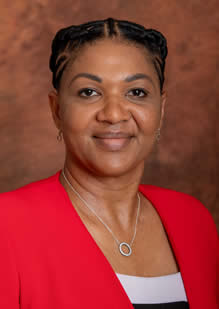Keynote Address By Deputy Minister Swarts at the Global Land Degradation Neutrality
13 May 2025, Sandton
Programme Director,
Global Mechanism of the UNCCD,
Donors,
Partners,
UN agencies present,
Distinguished guests and delegates from the Land Degradation Neutrality Phase 2 participating countries,
Ladies and gentlemen.
Allow me to welcome you to day 1 of the Global Land Degradation Neutrality – Integrated Land Use Planning (LDN – ILUP) Inception Workshop.
In the next four days we will deliberate on issues relating to desertification, land degradation and drought. I am pleased to confirm that many faces here are not new to me as I had an opportunity to meet many of you during the United Nations Convention to Combat Desertification (UNCCD) 16th Session of the Conference of Parties in Saudi Arabia.
As you may recall, the UNCCD COP16 underscored the need to mobilise additional and innovative resources to support Parties in accelerating actions and interventions on the ground to address Desertification, Land Degradation, and Drought (DLDD) and synergies with other environmental issues.
As you are aware, South Africa assumed the G20 Presidency on 01 December 2024 under the theme 'Solidarity, Equality and Sustainability'. This theme is underpinned by the need to focus on a number of key areas such as global governance reform, environment and climate finance, trade, health and financing for development amongst others.
South Africa’s G20 Presidency is taking place at a moment in which the world is facing severe environmental challenges, such as climate change and global warming, water scarcity, migration, worsening of drought impacts, floods, wildfires, soil and forest degradation. Across the world, billions of people are affected by environmental crisis, underdevelopment, inequality, poverty, hunger and unemployment. Different reports and statistics also indicate that, annually, 100 million hectares of healthy and productive land is lost or degraded, and this is impacting the lives of 1.3 billion people.
In line with the overall theme of South Africa’s Presidency of the G20, the overarching objective of the G20 Environment and Climate Sustainability Working Group (ECSWG) is to advance the environmental dimension of the 2030 Agenda for Sustainable Development focusing on a number of priorities and deliverables. Such priorities include Biodiversity and Conservation; Desertification, Land Degradation and Drought (DLDD); Chemicals and Waste Management; Climate Change and Air Quality; as well as Oceans and Coasts.
For the first time in the history of the G20 Presidency, South Africa has made a bold commitment by including DLDD issues amongst its G20 priorities. This commitment fosters global solidarity in addressing the drivers of DLDD while promoting the mainstreaming of Sustainable Land Management practices and approaches across key sectors. The main focus under the G20 priority on DLDD is on the implementation of Land Degradation Neutrality (LDN) targets and its deliverables.
Distinguished delegates, the main purpose of reviewing and refining our LDN targets is to ensure that our national efforts remain responsive, evidence-based, and aligned with evolving socio-economic and environmental conditions. It is my considered view that, a key principle of LDN is that people at grassroot level, whose daily decisions and actions directly impact land and water resources, should be actively involved in implementing measures to address DLDD. With this, there is an urgent need to sustain the availability of healthy and productive land in line with our national priorities and commitments. And this can be done through the adoption of Sustainable Land Management practices and ecosystem restoration.
I would like to urge all the 18 participating countries in the phase two of LDN Targets Setting Programme that, you are carrying the hope of the global vulnerable communities affected by DLDD. This is an opportunity for us to demonstrate that indeed land degradation neutrality is a vehicle that will accelerate the implementation of this Convention. What is required now is concrete actions on the ground through the implementation of large-scale restoration programmes and projects including transboundary efforts and initiatives. Everything happens in the land and there is a need for us to address land issues through sustainable restoration efforts if we are to win the fight against DLDD.
For us to deliver on the LDN targets and commitments, we need to consolidate the progress we have made through initiatives and programmes such as the Changwon Initiative, African Landscape Restoration Initiative (AFR100), the Great Green Wall Initiatives, the United Nations Decade on Ecosystem Restoration and the G20 Global Land Initiative amongst others.
Ladies and gentlemen, all these initiatives provide us with an opportunity to harness and strengthen our partnership while fostering synergies in building capacity for the mobilisation of resources to upscale the implementation of projects and programmes that address land restoration, proactive drought management and conservation of biodiversity.
I would like to urge our development and financial partners that are present here today to continue supporting Parties to mobilise substantial and innovative financial resources. Without substantive financial resources, we will not achieve all the commitments, obligations and targets set under the Convention on Biological Diversity and Climate Change.
While we appreciate the support from the Global Mechanism of the UNCCD and all its partners and donors, our view is that adequate financial resources still need to be mobilised to implement the LDN targets and land restoration related initiatives. We cannot continue developing frameworks and strategies without addressing issues that our vulnerable communities are faced with daily.
As I conclude distinguish delegates, let me extend my sincere appreciation and gratitude to our partners and donors, such as Global Mechanism of the UNCCD, Global Environment Facility, International Union for the Conservation of Nature, Changwon Initiative, Canada and the Germany Federal Ministry for Economic Cooperation and Development for making this global training a success. We do recognise technical and financial resources provided in this regard.
I would like to wish you a fruitful engagement and discussions that will produce tangible results over the next four days.
I thank you.
For media enquiries please contact:
Peter Mbelengwa:
Tel:+27 82 611 8197
E-mail: pmbelengwa@dffe.gov.za


